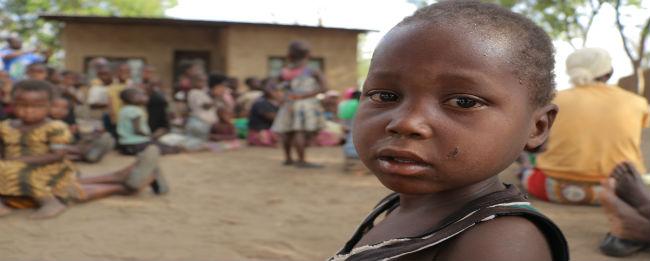Oxfam Scotland finds urgent need in Scotland’s core international development partner country
The men facing down soldiers to steal trees to produce charcoal so their family can eat one meal that day. The women sneaking out at night to exchange sex for food. The children missing school to sell plastic bags at the market, earning the only income their household can rely on.
These are the worrying realities for many people across Malawi – the country known as ‘the warm heart of Africa’ – amid a drought that has left 6.5 million people facing hunger.
Head of Oxfam Scotland Jamie Livingstone visited Malawi to learn more about the food crisis gripping the country and to promote Oxfam Scotland’s emergency appeal. What he saw and heard was deeply troubling and reinforced the urgent level of need.
“Malawi has been hit by the worst droughts to affect southern Africa in 35 years, a result of climate change and compounded in its impact by the El Nino weather phenomenon. Right now, over 6.5 million people do not have enough food, more than the entire population of Scotland”, explains Livingstone.
“What this means in reality is that people are in basic survival mode and are driven towards a series of worrying coping mechanisms. In all of the districts I visited, I heard about the rise in the illegal sale of charcoal, dangerous small-scale mining activities, the growth in prostitution, and the decline in school attendance caused by children dropping out to earn income.
“The need for more resources and support is urgent if we are to break these toxic cycles.
If ever the people of Malawi needed Scotland’s help, it is now. We therefore urge people in Scotland to support our emergency appeal in any way they can with every penny doubled by the Scottish Government.”
Malawi was recently named as a core recipient of Scottish Government aid following a review of the International Development Programme. Oxfam Scotland’s Malawi food crisis appeal is currently being match funded by the Scottish Government, meaning that all donations are worth double.
In April, the Government of Malawi declared a state of emergency over the drought, which has caused the widespread failure of the country’s staple crop: maize.
Jenipher Nkotima, 24, from Nkanda village in Mulanje, looks after her three young nephews after her sister died. She described some days being able to scrape together one meal per day, but on others eating nothing at all.
Jenipher said: “Last year the harvest was very low. I had four bags of maize and only consumed in three months. I also had pigeon peas which I sold and bought maize which is also finished. I have no food. Now I am pleading for help.”
She added: “If no assistance comes then I can easily lose one of these orphans to hunger because it would be a continuation of food shortage from last season and that would be too bad. I have no one to help me and my situation is dire.”
In a nearby Kazembe village, Julius, Matheyo, 32 and Lucy Mugawa, 24, who have six children – including four belonging to Lucy’s deceased sister – described making money in any way they can after their crops failed. This includes illegally cutting down trees for firewood and to make charcoal to sell.
Julius said: “The forest guards chase us all the time. But when I am lucky I fell the trees and sell it just to find money and feed my family. I know it is against the law but that is the only means if I am to feed these children and to
keep them alive. “
Oxfam is part of a consortium of charities delivering emergency aid in line with the Malawian Government’s emergency response plan. As well as cash payments to help people buy food, Oxfam is working with local partners to deliver projects to boost their resilience to climate shocks, including small-scale irrigation projects, access to seed and fertilizers, and the creation of savings groups.
John Makina, Country Director for Oxfam in Malawi, said: “Oxfam aims to reach 650,000 people across Malawi by June 2017, but we need more resources in order to do so. Our response is only around 60 per cent funded and the need is growing.
“We have seen people withstand this current crisis with just a small amount of support like access to vegetable seeds, fertilizer and training. They have managed to avoid the worst impacts of hunger and still have enough crop to sell to send their children to school.
“However, we know some farmers have little option but to resort to desperate acts in order to survive. They urgently need help. We ask the international community, including our friends in Scotland, to do all they can to support our emergency response.”
· Oxfam Scotland’s Malawi Food Crisis Appeal: https://www.oxfam.org.uk/what-we-do/emergency-response/malawi-food-crisis
· All donations to Oxfam Scotland’s appeal up to a total of £140,000 are being doubled by the Scottish Government until December 31, 2016.
